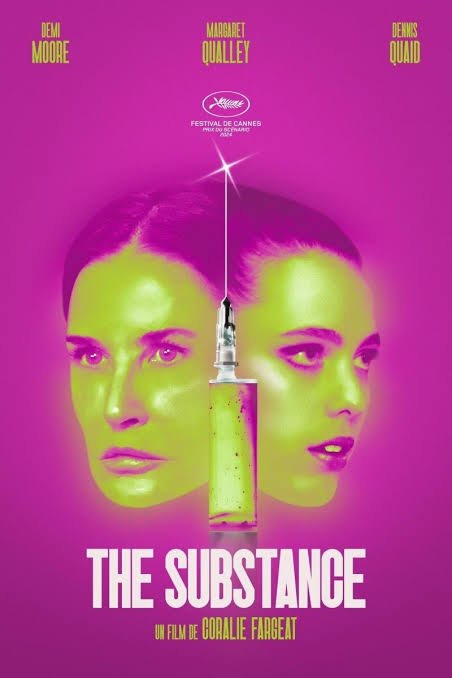Coralie Fargeat’s 2024 body-horror film, “The Substance,” is a vibrant, satirical, provocative, and grotesque exploration of society’s obsession with youth and beauty. The movie, starring Demi Moore as Elisabeth Sparkle, an aging celebrity fitness guru, takes viewers on a wild ride as Sparkle discovers an underground drug that promises to transform her into a younger, enhanced version of herself, Sue (played by Margaret Qualley). However, the drug comes with strict rules – and when Sparkle breaks them, the consequences spiral into disturbing territory.
At first, the film appears to offer a fresh, simple critique of society’s unhealthy fixation on aging and beauty. But as the narrative unfolds, it evolves into a brutal and unsettling dissection of corporate misogyny. “The Substance” highlights the intense societal pressure on women to maintain a specific appearance and demeanor, underscoring the entertainment industry’s harsh double standards. The film points to the fleeting opportunities afforded to women in Hollywood, in stark contrast to the longevity of their male counterparts.
Demi Moore’s career serves as a fitting parallel. Despite being one of the highest-grossing actresses of the 1990s, Moore has faced dwindling opportunities in mainstream cinema over the past two decades. Her return to the spotlight in “The Substance” feels like a deliberate reclamation of agency, not just for herself but for countless women whose contributions to the industry have been overlooked or dismissed.
Fargeat’s film also addresses the psychological impact of this systemic misogyny. Sparkle’s self-destructive tendencies stem from years of external judgment and internalized shame, making it difficult for her to reconnect with her true self, even when given the chance.
“The Substance” pulls no punches in its portrayal of gender dynamics. Male characters are depicted as immature, greedy, or predatory, while female characters are hyper-sexualized – a conscious choice that mirrors the way women’s bodies are often valued over their talents and achievements. The film makes no attempt to soften its critique, offering explicit scenes that are unrelenting, yet purposeful.
Instances like a casting director’s inappropriate comments or a producer’s dismissive remark – “pretty girls should always smile” – are blatant in their messaging, making the film’s intentions clear. The overwhelming nature of the content is exhausting, but rather than detracting from the experience, it reinforces the oppressive environment the film seeks to expose.
Despite its heavy themes, “The Substance” embraces moments of levity, leaning into the absurdity of its premise. This self-awareness grounds the narrative, ensuring the film’s outrageous elements never feel misplaced.
The final act is a relentless, gore-filled climax that feels never-ending – chaotic and overwhelming, yet consistently engaging. While the film occasionally struggles under the weight of its own ambition, it quickly regains momentum, pushing boundaries even further.
For those with a high tolerance for gore and unsettling imagery, “The Substance” offers a unique and unforgettable viewing experience. It’s bold, entertaining, and thought-provoking, cementing itself as one of the standout films of the year.
| Director | Coralie Fargeat |
| Producer | Coralie Fargeat, Eric Fellner, Tim Bevan |
| Screenwriter | Coralie Fargeat |
| Distributor | MUBI |
| Production Company | Working Title Films |
| Rating | R (Graphic Nudity, Gore, Language, Strong Violent Content) |
| Genre | Horror, Drama |
| Original Language | English |
| Release Date (Theaters) | Sep 20, 2024, Wide |
| Release Date (Streaming) | Oct 31, 2024 |
| Box Office (Gross USA) | $16.4M |
| Runtime | 2h 21m |
| Sound Mix | Dolby Digital |
| Aspect Ratio | Digital 2.39:1 |
Rating: 8/10
Categories: Mosaic, Pop Culture and Entertainment
Tags: Alex Lavinson, Blue Hens, body horror, Coralie Fargeat, Delaware, Demi Moore, Dennis Quaid, Gore, Horror, Lilly Conlan, Margaret Qualley, movie review, Newark, sexism, The Review, The Substance, UD, UD Review, University of Delaware






